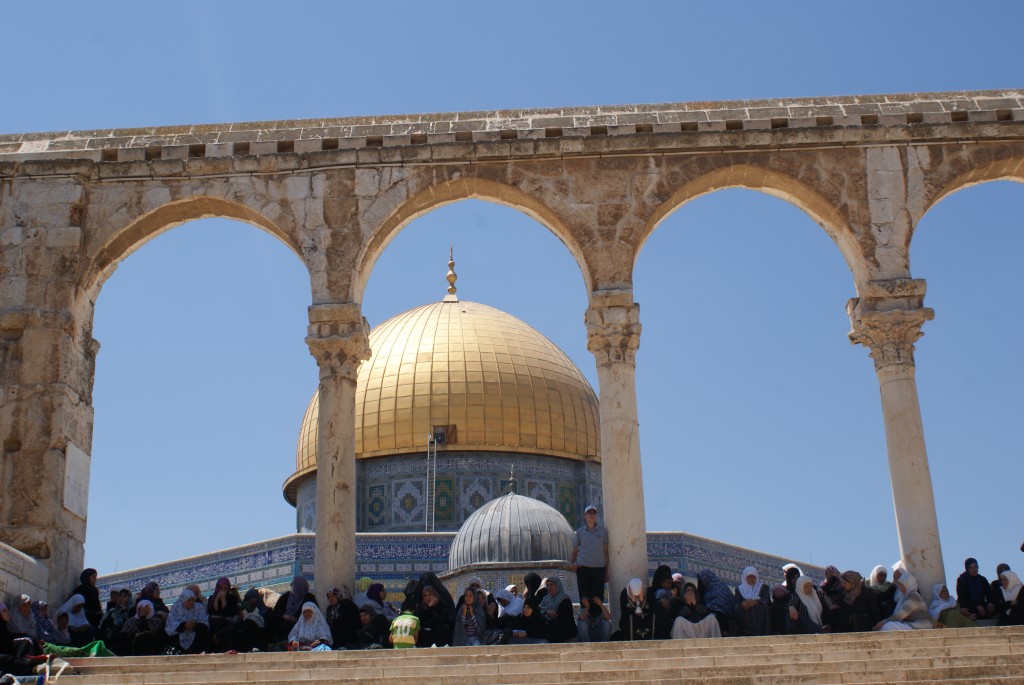Al-Aqsa: From political battleground to spiritual common ground
By Khaled Diab
For Muslims and Jews to share peacefully and justly the Holy Sanctuary/Temple Mount requires the resolution of the Israeli-Palestinian conflict.

Friday 25 September 2015
The growing familiarity of clashes between Israeli security forces and Palestinian protesters inside the al-Aqsa Mosque has not weakened their impact on my Palestinian neighbours and friends in Jerusalem.
The picturesque, stone-lined alleyways of an already tense Old City are seething with anger and frustration, punctuated by Israeli surveillance helicopters that hang in the air. Even unreligious Palestinians who have never set foot inside churches or mosques are furious. They partly envisage their wider demise encapsulated by the struggle over the Noble Sanctuary, as they call it, or the Temple Mount, as it is known to Jews.
“We call on the international community, including Arab countries and Muslim states, to intervene immediately before Israel succeeds in launching a global holy war,” urged Hanan Ashrawi, the veteran Palestinian politician, activist and academic.
Though this largely secular conflict is far from being a “holy war”, as I have argued before, if Israel continues down its unilateral path on this issue, it could become a self-fulfilling prophecy.
The religious symbolism of the tensions around the holy site have sent tremors and shockwaves across the region and internationally. The clashes in the Noble Sanctuary, as it is known to Muslims, and the Temple Mount, as Jews refer to it, provoked a stern warning from neighbouring Jordan, with which Israel has a peace accord. “Anymore provocations in Jerusalem will affect the relationship between Jordan and Israel,” warned King Abdullah. “Jordan will have no choice but to take action, unfortunately.”
The European Union and the United States also expressed their concerns about the escalating situation. “It is crucial that all parties demonstrate calm and restraint and full respect for the status quo of the holy sites,” European Commission spokeswoman Maja Kocijancic told reporters.
The “status quo” in question is one that has governed the Noble Sanctuary/Temple Mount since Israel conquered Jerusalem in 1967, whereby the Islamic Waqf and Jordan manage the site and control access to it, with limited non-Muslim visits permitted but worship banned.
But it is apprehension that the Israeli right intends to tear up this status quo that has fuelled the latest clashes – just as they did last year. Back then, Jordan recalled its ambassador to Israel and threatened to review its peace treaty with Israel following a Knesset debate, sponsored by the far-right parliamentarian Moshe Feiglin, on whether or not Israel should seize sovereignty of the holy site and allow Jewish worship there.
“Israelis are trying to establish a precedent by dividing [the Holy Sanctuary] into sections and time segments, so they can give Israeli settlers access to our mosque,” said Abdel-Aziz Abasi, who is a member of Mourabitoun, a group of Palestinian activists, which Israel recently banned, who see their role as guarding the compound against Jewish encroachment. “We will never agree to such a plan.”
Although relatively few Israelis actually visit the Temple Mount and have traditionally been content with the status quo, Religious Zionists and Jewish extremists have managed to make headway in recent years by framing the issue as one of religious freedom at Judaism’s holiest site.
Even the lunatic fringe, such as Yehuda Glick, who fantasises about constructing the Third Temple, is pursuing the civil liberties path. Appropriating language from the South African civil rights movement, Glick said at a demonstration during Ramadan: “We’re here to protest against the apartheid on the Temple Mount.”
But what the religious freedom argument airbrushes out is that this issue is about far more than the right to worship, especially in a situation where Israel regularly restricts Palestinian entry to al-Aqsa.
You could also say that the Noble Sanctuary/Temple Mount is simply a spiritual microcosm of the Israeli-Palestinian conflict at large.
This jewel in the crown of Jerusalem’s old city, with its gold-plated Dome of the Rock dominating the skyline, contains many of the elements perpetuating the conflict, writ spiritual: control of and sovereignty over the land, asymmetric power, national identity, the relationship between Israelis and Palestinians, movement restrictions, draconian laws, not to mention the status of Jerusalem.
Personally, I’m in favour of Jews, one day, worshipping on their religion’s most sacred, hallowed ground. And my view, though controversial today, is not unprecedented in the history of Islam. Following the surrender of Jerusalem to the Arab armies, Omar Ibn al-Khattab, the second caliph, allowed Jews, who had been expelled by the Byzantines, back into Jerusalem.
Omar ordered the cleaning of the Temple Mount, which had been used as a rubbish tip by the Byzantines, and, some historians posit, permitted Jews to worship there, a practice which continued for a century, into the Umayyad era.
One Jewish convert to Islam, Rabbi Kaab al-Ahbar, even located the foundation stone for the Muslim conquerors. It is even possible that Omar allowed the Jews to construct a synagogue on the mount and appointed a Jew as the first governor of Jerusalem, according to the 7th century Armenian historian Sebeos.
In the presumably enlightened 21st century, it should be possible for Muslims and Jews to share this holy site, which has no shortage of space, and rediscover the many long centuries of relatively peaceful coexistence they enjoyed. Perhaps, one day, in a possible future, Jews and Muslims will be able to share the Noble Sanctuary’s tranquil and soothing esplanade, which takes up about a sixth of the old city’s surface area, and where families picnic and children play football.
However, for that to happen requires the resolution of the underlying conflict. Without peace, it is impossible to think that Palestinians and Israelis will find the necessary good will and trust to compromise over this holiest of locations.
____
Follow Khaled Diab on Twitter.
This article first appeared on Al Jazeera on 16 September 2015.


